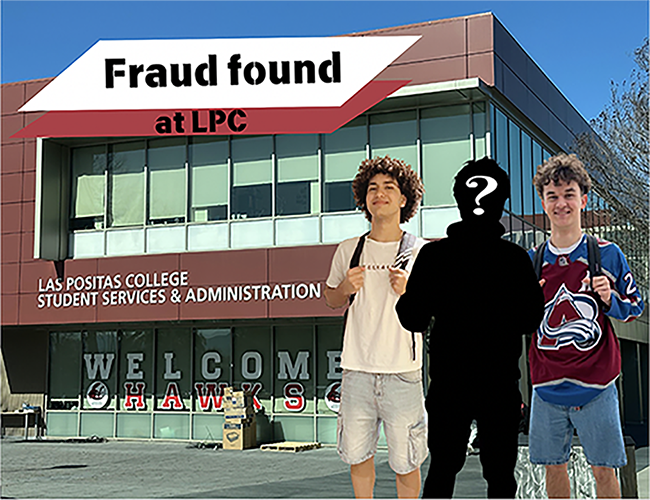Throughout the last couple of years, fraudulent students have been getting into community college systems across California, including Las Positas College. Students have become aware of the issue recently, finding it more difficult to get into their courses using CLASS-Web, the LPC class registration platform.
Fraudulent students are taking up class spots causing courses to seem full. Professors don’t know who to keep in their classes, especially with online courses, and fraudulent students are taking financial aid from others.
Following the increase in online courses offered during and after the COVID-19 pandemic, California Community College’s (CCC) system began finding fake students enrolling at an increasing rate.
“This is a concerning problem and is very frustrating for our real students who struggle to enroll in classes needed for graduation and students who need to register for a certain number of units to fulfill financial aid or international student program requirements,” Suzanne Kohler, senior administrative assistant of enrollment services, said. “My best advice for students is to register for classes as close to their priority registration date and time as possible.”
Students were reminded of the problem when enrollment opened on Nov. 26. Students found many general education classes, including English courses, already full by early December. Many students had to take classes they weren’t originally interested in, or were forced to find alternative course plans. This included taking an online class when an in-person class was desired, taking a course sooner than expected or simply taking a class because there were no other options.
“It’s not exactly a new problem,” Kevin Harral, LPC’s director of financial aid, said. “During the COVID-19 pandemic, when the federal government sent billions of dollars to colleges to support transitions to online teaching/learning and to support students with extra money, that had far easier eligibility criteria.” Loose requirements left room for fraudulent students to slip through.
These problems are already common for college students, but fraudulent enrollment adds undue pressure.

Las Positas has been hit with fraudulent students in class rosters. This causes trouble for administration, professors and students in starting the new semester. (Photo illustration by Maximilien Kiyoi/ The Express)
“I didn’t get to take an in-person stats class ‘cause the day I got my priority (registration), every in-person stats class was already filled,” psychology major Dylan Gleade said. “So it made getting classes hard.”
Gleade observed that courses were mostly full during the priority registration period, but more spots became available during open registration. Between these two periods, the administration likely reviewed course rosters and removed suspicious student enrollments, leaving spots open for registration.
Harral explained that one of the issues caused by uncertain class rosters is the empty spots in classes caused by legitimate students being unable to register before fraudulent students are removed. “Faculty are paid on class load and a class artificially inflated by fake/fraudulent students causes a strain in college funding,” Harral said.
“Enrollment has grown nearly 25% over the past two years (2022-2024) … Classes at Las Positas are 95% full for the fall (2024) term, an all-time high, according to the school’s institutional research office,” Chris Winters wrote in The Independent.
“The college is funded by enrollment numbers from the state and those numbers being inflated by fake students causes concerns about the legitimacy of that flow of state funding,” Harral said.
The CCC’s fraud prevention plan includes “improving resistance to bots and automated scripting attacks; supplying technology and funding to enhance local college application reviews and assessments; evolving and refining existing fraud mitigation strategies.”
The prevention plan discusses the main ways fraud has been found in the system: admission application fraud, “completing the application process with the college locally without the intent to attend college for educational purposes,” enrollment fraud, “registering for classes without the intent to legitimately attend,” and financial aid fraud, “attempting to collect financial aid to which the applicant is not legally entitled.”
***
TOP PHOTO: Many students have been unable to take their desired classes with fake students taking their place. It has caused many to take classes they didn’t plan on enrolling in this semester. (Photo credit: Envato Elements)
Maximilien Kiyoi is a staff writer of The Express. Follow them on X, formally Twitter, @Max445193989306.




